|
STS (исследования науки и технологий, science and technology studies) – относительно молодая и одна из наиболее динамично развивающихся областей социогуманитарных исследований, включающая такие направления, как социология науки и техники, антропология науки и техники, история науки и технологий, философия науки, сравнительная социология (comparative sociology). Интерес к науке и технологиям возник довольно давно - как минимум с появлением и институционализацией этих феноменов (т. е. с XVII века). Однако вплоть до 1980-хг. социальные ученые редко интересовались содержанием научного знания и тем более содержанием естественнонаучного и технического знания. Миф Чарльза Сноу о двух культурах, подкрепляемый образовательными традициями, до сих пор воспроизводится в современном мире и делит всех ученых на два лагеря: ученых-естественников и технических специалистов, с одной стороны, и социальных ученых и гуманитариев – с другой. STS впервые бросили вызов этому разделению и продемонстрировали, что само содержание знания естественных и технических наук объясняется средствами гуманитарных и социальных наук. Тем самым естественные и технические науки включены в политические, социальные и культурные процессы, которые организуют жизнь всего остального общества. Идеологическая задача STS – показать искусственность разделения мира на «физиков» и «лириков», исследовать социальные основания разных наук и подумать над принципами совместного существования, в котором активное участие принимают и философ, и физик, и инженер. STS – это междисциплинарная область, которая объединяет социологов, антропологов, историков, философов, географов и других специалистов в гуманитарных и социальных науках. |
Книги по теме выставки из фондов Библиотеки ЕУСПб ______________________ Ресурсы Библиотеки ЕУСПб по теме выставки в поисковой системе Summon ______________________ Коллекция книг, переданных в дар Библиотеке ЕУСПб почетным профессором истории наук Массачусетского технологического института Лореном Р. Грэхэмом ______________________ ______________________ ______________________ Society for Social Studies of Science (4S) - международная профессиональная ассоциация исследователей науки и технологий (STS), основана в 1975 году |
...............................................................................................................................................
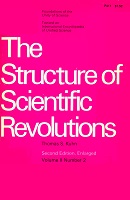 Kuhn, Thomas. The Structure of Scientific Revolutions / T. S. Kuhn. - 2d ed., enlarged. - Chicago : The University of Chicago Press, 1970. - xii, 210 p. - (International Encyclopedia of Unified Science ; vol. 2. Num. 2). - ISBN 0-226-45804-0
Kuhn, Thomas. The Structure of Scientific Revolutions / T. S. Kuhn. - 2d ed., enlarged. - Chicago : The University of Chicago Press, 1970. - xii, 210 p. - (International Encyclopedia of Unified Science ; vol. 2. Num. 2). - ISBN 0-226-45804-0
A good book may have the power to change the way we see the world, but a great book actually becomes part of our daily consciousness, pervading our thinking to the point that we take it for granted, and we forget how provocative and challenging its ideas once were - and still are. "The Structure of Scientific Revolutions" is that kind of book. With "The Structure of Scientific Revolutions", Kuhn challenged long-standing linear notions of scientific progress, arguing that transformative ideas don’t arise from the day-to-day, gradual process of experimentation and data accumulation but that the revolutions in science, those breakthrough moments that disrupt accepted thinking and offer unanticipated ideas, occur outside of "normal science", as he called it. Though Kuhn was writing when physics ruled the sciences, his ideas on how scientific revolutions bring order to the anomalies that amass over time in research experiments are still instructive in our biotech age. Thomas S. Kuhn, formerly on the faculty of the University of California, is now professor of the history of science at Princeton
...............................................................................................................................................
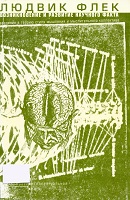 Флек, Людвик. Возникновение и развитие научного факта : введение в теорию стиля мышления и мыслительного коллектива / Л. Флек; сост., пер. с англ., нем., польск., предисл. В. Н. Порус ; Университет Российской академии образования, Кафедра философии. - М. : Дом интеллектуальной книги : Идея-Пресс, 1999. - 220 с. - Пер. изд. : Entstehung und entwicklung einer Wissenschaftlichen Tatsache / L. Fleck. - Basel, 1935. - ISBN 5-7333-0018-3
Флек, Людвик. Возникновение и развитие научного факта : введение в теорию стиля мышления и мыслительного коллектива / Л. Флек; сост., пер. с англ., нем., польск., предисл. В. Н. Порус ; Университет Российской академии образования, Кафедра философии. - М. : Дом интеллектуальной книги : Идея-Пресс, 1999. - 220 с. - Пер. изд. : Entstehung und entwicklung einer Wissenschaftlichen Tatsache / L. Fleck. - Basel, 1935. - ISBN 5-7333-0018-3
Основной труд замечательного польского ученого-гуманиста, врача-микробиолога и философа Л. Флека впервые публикуется на русском языке. Т. Кун в предисловии к своей знаменитой книге "Структуры научных революций" сослался на работы Л. Флека наряду с блестящими именами А. Койре, Ж. Пиаже, Е. Мецгер и др. как на теоретические источники собственных воззрений о природе научного познания и роли истории науки в формировании эпистемологических моделей. Однако эти работы имеют самостоятельное научное значение и позволяют считать Л. Флека одним из основоположников современной социологии науки и сравнительной эпистемологии
Фрагмент вступительной статьи (В.Н. Порус)
...............................................................................................................................................
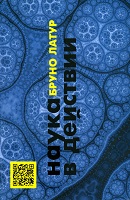 Латур, Бруно. Наука в действии : следуя за учеными и инженерами внутри общества / Б. Латур ; пер. с англ. К. С. Федорова ; авт. предисл. О. В. Хархордин ; Европейский университет в Санкт-Петербурге. - СПб. : Изд-во ЕУСПб, 2013. - 414 с. - (Прагматический поворот ; вып. 6). - Пер. изд. : Science in Action : How to Follow Scientists and Engineers through Society / B. Latour. - Cambridge, Mass. ; London, 1987. - ISBN 978-5-94380-161-7
Латур, Бруно. Наука в действии : следуя за учеными и инженерами внутри общества / Б. Латур ; пер. с англ. К. С. Федорова ; авт. предисл. О. В. Хархордин ; Европейский университет в Санкт-Петербурге. - СПб. : Изд-во ЕУСПб, 2013. - 414 с. - (Прагматический поворот ; вып. 6). - Пер. изд. : Science in Action : How to Follow Scientists and Engineers through Society / B. Latour. - Cambridge, Mass. ; London, 1987. - ISBN 978-5-94380-161-7
Бруно Латур - один из самых ярких представителей современной социологической мысли, в корне изменивший наши представления о процессе научного познания и взаимодействии науки и общества. Эта книга представляет собой важнейший этап осмысления Латуром научных практик. Автор анализирует создание и последующее расширение экспериментальной сети, ключевыми звеньями которой выступают лабораторные объекты, оборудование и люди. Со стороны развитие науки видится как череда успехов и открытий, но на деле это кропотливая и зачастую механическая работа, далеко не всегда приводящая к необходимому результату. Латур "открывает" для читателя научную лабораторию, процесс научного поиска перестает быть черным ящиком, закрытой машиной по производству знания, а наука рассматривается как часть деятельности человека в мире
Фрагмент предисловия (О.В. Хархордин)
...............................................................................................................................................
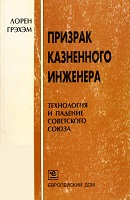 Грэхэм, Лорен. Призрак казненного инженера : технология и падение Советского Союза / Л. Р. Грэхэм; пер. с англ. А. Стручков. - СПб. : Европейский дом, 2000. - 184 с. - Пер. изд. : The Ghost of the Executed Engineer : Technology and the Fall of the Soviet Union / L. R. Graham. - Cambridge, Mass. ; London, 1993. - ISBN 5-8015-0060-X
Грэхэм, Лорен. Призрак казненного инженера : технология и падение Советского Союза / Л. Р. Грэхэм; пер. с англ. А. Стручков. - СПб. : Европейский дом, 2000. - 184 с. - Пер. изд. : The Ghost of the Executed Engineer : Technology and the Fall of the Soviet Union / L. R. Graham. - Cambridge, Mass. ; London, 1993. - ISBN 5-8015-0060-X
Предисловие: "Эта книга представляет собой попытку объяснить, почему Советский Союз не стал передовой индустриальной страной. Она открывается историей жизни замечательного русского инженера Петра Пальчинского, который ясно видел ошибки, сопровождавшие первые годы советской индустриализации, и пытался исправить их. Эта история служит параболой для второй части книги, посвященной анализу отношения к промышленности и технике в Советском Союзе в течение шестидесяти лет после гибели Пальчинского, чья критика дурного использования техники и разбазаривания человеческих сил оставалась злободневной все это время, как будто его призрак продолжал витать над страной вплоть до ее ликвидации в конце 1991 года. В обе части книги вплетена история моих собственных, продолжавшихся более тридцати лет, попыток раскрыть тайну Пальчинского и его роль в индустриализации Советского Союза. Почти в каждом учебнике советской истории упоминается процесс Промышленной партии 1930 года - судилище над большой группой ведущих российских инженеров. Лишь немногие из этих учебных пособий, однако, содержат какие бы то ни было сведения о человеке, якобы возглавлявшем Промышленную партию, - Петре Пальчинском..."
...............................................................................................................................................
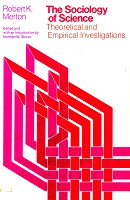 Merton, Robert King. The Sociology of Science : Theoretical and Empirical Investigations / R. K. Merton ; ed., introd. author N. W. Storer. - Chicago ; London : The University of Chicago Press, 1973. - xxxi, 605 p. - ISBN 0-226-52092-7
Merton, Robert King. The Sociology of Science : Theoretical and Empirical Investigations / R. K. Merton ; ed., introd. author N. W. Storer. - Chicago ; London : The University of Chicago Press, 1973. - xxxi, 605 p. - ISBN 0-226-52092-7
From Introduction: "... The papers collected here are intended to serve several purposes. Primarily, the volume brings together a number of articles that have been of central significance in the development of the sociology of science, together with others which are representative of certain stages in that process. At the same time, the collection may provide a sense of the intellectual continuity and coherence of the field; more clearly here than in some other fields of sociology, the seeds of future growth can be readily found in papers antedating this growth by ten years and more. In a more practical vein, enclosing these papers drawn from many different sources within a single cover will afford easy access to them for those wanting to make use of them in their own work. Finally, the collection pays tribute to the author; the substance and style of the papers themselves record, in a way mere panegyric could not, the enduring importance of his work. The papers are not presented in strictly chronological order. The warp and woof of the entire corpus is drawn so tight - the intersections of different threads of thought are so frequent - that it has seemed better to separate and group the major elements in this mosaic for concentrated attention than to leave the task entirely to the reader. It is hoped that in this way the continued clarification of ideas and the ways they have been woven together to give added strength to this growing body of knowledge will be made more visible..." - Norman W. Storer
Фрагмент предисловия (N.W. Storer)
...............................................................................................................................................
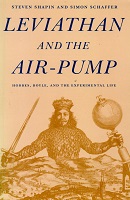 Shapin, Steven. Leviathan and the Air-Pump : Hobbes, Boyle and the Experimental Life / S. Shapin, S. Schaffer. - Princeton, N.J. : Princeton University Press, 1985. - xiv, 440 p. - ISBN 0-691-02432-4. - ISBN 0-691-08393-2
Shapin, Steven. Leviathan and the Air-Pump : Hobbes, Boyle and the Experimental Life / S. Shapin, S. Schaffer. - Princeton, N.J. : Princeton University Press, 1985. - xiv, 440 p. - ISBN 0-691-02432-4. - ISBN 0-691-08393-2
In the aftermath of the English Civil War, as people were groping for new forms of political order, Robert Boyle built an air-pump to do experiments. Does the story of Roundheads and Restoration have something to do with the origins of experimental science? Schaffer and Shapin believed it does. Focusing on the debates between Boyle and his archcritic Thomas Hobbes over the air-pump, the authors proposed that "solutions to the problem of knowledge are solutions to the problem of social order". Both Boyle and Hobbes were looking for ways of establishing knowledge that did not decay into ad hominem attacks and political division. Boyle proposed the experiment as cure. He argued that facts should be manufactured by machines like the air-pump so that gentlemen could witness the experiments and produce knowledge that everyone agreed on. Hobbes, by contrast, looked for natural law and viewed experiments as the artificial, unreliable products of an exclusive guild. The new approaches taken in Leviathan and the Air-Pump have been enormously influential on historical studies of science. Shapin and Schaffer found a moment of scientific revolution and showed how key scientific givens - facts, interpretations, experiment, truth - were fundamental to a new political order. Shapin and Schaffer were also innovative in their ethnographic approach. Attempting to understand the work habits, rituals, and social structures of a remote, unfamiliar group, they argued that politics were tied up in what scientists did, rather than what they said
...............................................................................................................................................
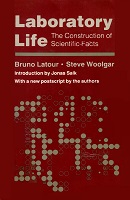 Latour, Bruno. Laboratory Life : the Construction of Scientific Facts / B. Latour, S. Woolgar ; introd. author J. Salk. - 2nd ed. - Princeton, N.J. : Princeton University Press, 1986. - 294 p. : il. - ISBN 0-691-02832-X
Latour, Bruno. Laboratory Life : the Construction of Scientific Facts / B. Latour, S. Woolgar ; introd. author J. Salk. - 2nd ed. - Princeton, N.J. : Princeton University Press, 1986. - 294 p. : il. - ISBN 0-691-02832-X
This highly original work presents laboratory science in a deliberately skeptical way: as an anthropological approach to the culture of the scientist. Drawing on recent work in literary criticism, the authors study how the social world of the laboratory produces papers and other "texts", and how the scientific vision of reality becomes that set of statements considered, for the time being, too expensive to change. The book is based on field work done by Bruno Latour in Roger Guillemin's laboratory at the Salk Institute and provides an important link between the sociology of modern sciences and laboratory studies in the history of science. Bruno Latour is Associate Professor at the Ecole Nationale Superieure des Mines in Paris. Steve Woolgar is lecturer in sociology at Brunei University
...............................................................................................................................................
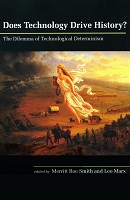 Does Technology Drive History? The Dilemma of Technological Determinism / ed.: M. R. Smith, L. Marx. - Cambridge, Mass. ; London, UK : MIT Press, 1994. - 280 p. - ISBN 0-262-69167-1
Does Technology Drive History? The Dilemma of Technological Determinism / ed.: M. R. Smith, L. Marx. - Cambridge, Mass. ; London, UK : MIT Press, 1994. - 280 p. - ISBN 0-262-69167-1
These thirteen essays explore a crucial historical question that has been notoriously hard to pin down: To what extent, and by what means, does a society’s technology determine its political, social, economic, and cultural forms? Karl Marx launched the modern debate on determinism with his provocative remark that "the hand-mill gives you society with the feudal lord; the steam-mill, society with the industrial capitalist". Marx's position has become embedded in our culture in the form of constant reminders as to how our fast-changing technologies will alter our lives. Yet historians who have looked closely at where technologies really come from generally support the proposition that technologies are not autonomous but are social products, susceptible to democratic controls. The issue is crucial for democratic theory. These essays tackle it head-on, offering a deep look at all the shadings of determinism and assessing determinist models in a wide variety of historical contexts. Merritt Roe Smith is Cutten Professor of the History of Technology and Director of the Program in Science, Technology, and Society at the Massachusetts Institute of Technology, where Leo Marx is Senior Lecturer and Kenan Professor of American Cultural History Emeritus
...............................................................................................................................................
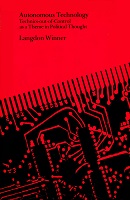 Winner, Langdon. Autonomous Technology : Technics-out-of-Control as a Theme in Political Thought / L. Winner. - Cambridge, Mass. ; London, UK : MIT Press, 1977. - 386 p. - ISBN 0-262-23078-X
Winner, Langdon. Autonomous Technology : Technics-out-of-Control as a Theme in Political Thought / L. Winner. - Cambridge, Mass. ; London, UK : MIT Press, 1977. - 386 p. - ISBN 0-262-23078-X
What does it mean to say "technology is out of control"? The expression sounds like a warning, but in what way, precisely, has technology slipped from human direction? Or is this merely an exaggerated statement of technology’s role in our lives? What is the relationship between technology and contemporary society? Can the use of technology be separated from its political implications? In the midtwentieth century, observers from several vantage points of the ideological spectrum have begun to voice serious misgivings about the unchosen consequences of rapid, pervasive technological development. With Paul Valery they ask: "Can the human mind master what the human mind has made?" In this important and persuasive new evaluation of technology’s effect on society, Langdon Winner examines the idea that technology has gotten out of hand. Under such categories as technological evolution, determinism, historical drift, and technological imperative, he discusses problems in modern conceptions of choice and decision. Maintaining that technologies are indeed political structures, the author scrutinizes the problems of governance engendered by the technological order. He looks at Bacon’s and Veblen’s ideas, as well as the dilemmas that technocracy poses for modern liberalism, as illustrated in Price’s notion of the "scientific estate" and Galbraith’s of the American "technostructure". Professor Winner, who views autonomous technology as the aggregate of human dilemmas rather than as univocal, uniform phenomenon, develops his own distinct perspective after pointing out the strengths and inadequacies in the theories of Marx, Ellul, Marcuse, Mumford, and others. His conceptual framework for a systematic view introduces the notion of reverse adaptation, in which ends are them selves altered in order to adjust to technical means...
...............................................................................................................................................
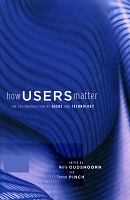 How Users Matter : the Co-Construction of Users and Technology / ed.: N. Oudshoorn, T. Pinch. - Cambridge, Mass. ; London, UK : MIT Press, 2003. - 340 p. - (Inside Technology). - ISBN 978-0-262-65109-7
How Users Matter : the Co-Construction of Users and Technology / ed.: N. Oudshoorn, T. Pinch. - Cambridge, Mass. ; London, UK : MIT Press, 2003. - 340 p. - (Inside Technology). - ISBN 978-0-262-65109-7
Users have become an integral part of technology studies. The essays in this volume look at the creative capacity of users to shape technology in all phases, from design to implementation. Using a variety of theoretical approaches, including a feminist focus on users and use (in place of the traditional emphasis on men and machines), concepts from semiotics, and the cultural studies view of consumption as a cultural activity, these essays examine what users do with technology and, in turn, what technology does to users. The contributors consider how users consume, modify, domesticate, design, reconfigure, and resist technological development - and how users are defined and transformed by technology. The book first shows how resistance to and non-use of a technology can be a crucial factor in the eventual modification and improvement of that technology, then looks at advocacy groups and the many kinds of users they represent, particularly in the context of health care and clinical testing. Finally, It examines the role of users in different phases of the design, testing, and selling of technology. Included here Is an enlightening account of one company’s design process for men’s and women’s shavers, which resulted in a "Ladyshave"’ for users assumed to be technophobes. Taken together, the essays in How Users Matter show that any understanding of users must take into consideration the multiplicity of roles they play - and that the conventional distinction between users and producers is largely artificial. Nelly Oudshoorn is Professor of Science and Technology Studies at the University of Twente in the Netherlands. Trevor Pinch is Professor of Science and Technology Studies and Professor of Sociology at Cornell University
...............................................................................................................................................
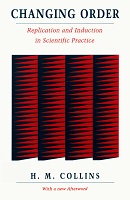 Collins, Harry. Changing Order : Replication and Induction in Scientific Practice / H. M. Collins. - Chicago ; London : The University of Chicago Press, 1992. - x, 199 p. - ISBN 0-226-11376-0
Collins, Harry. Changing Order : Replication and Induction in Scientific Practice / H. M. Collins. - Chicago ; London : The University of Chicago Press, 1992. - x, 199 p. - ISBN 0-226-11376-0
This work in the sociology of science explores the way scientists conduct, and draw conclusions from, their experiments. The book is organized around three case studies: replication of the TEA-laser, detecting gravitational radiation, and experiments in the paranormal. Through detailed descriptions of these projects, Collins shows what it is like to try to reproduce results in a laboratory. In his new Afterword, Collins places Changing Order in the context of some of the more obstinate debates of the last few years within the sociology of scientific knowledge. H. M. Collins is the director of the Science Studies Unit at the University of Bath
...............................................................................................................................................
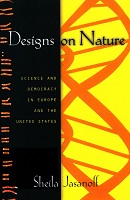 Jasanoff, Sheila. Designs on Nature : Science and Democracy in Europe and the United States / S. Jasanoff. - Princeton, N.J. ; Oxford : Princeton University Press, 2005. - 374 p. - ISBN 978-0-691-13042-2
Jasanoff, Sheila. Designs on Nature : Science and Democracy in Europe and the United States / S. Jasanoff. - Princeton, N.J. ; Oxford : Princeton University Press, 2005. - 374 p. - ISBN 978-0-691-13042-2
Biology and politics have converged today across much of the industrialized world. Debates about genetically modified organisms, cloning, stem cells, animal patenting, and new reproductive technologies crowd media headlines and policy agendas. Less noticed, but no less important, are the rifts that have appeared among leading Western nations about the right way to govern innovation in genetics and biotechnology. In this sweeping study of some twenty-five years of scientific and social development, Sheila Jasanoff compares the politics and policy of the life sciences in Britain, Germany, the United States, and in the European Union as a whole. She shows how public and private actors in each setting evaluate the products of biotechnology and try to reassure themselves about their safety and worth. Sheila Jasanoff is Pforzheimer Professor of Science and Technology Studies at Harvard University's John F. Kennedy School of Government. Trained at Harvard Law School, she is the author of many books on the role of science and technology in the politics of modern democratic societies, including "Science at the Bar", "The Fifth Branch", and "Risk Management and Political Culture"
...............................................................................................................................................
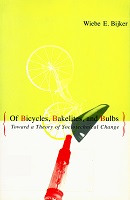 Bijker, Wiebe. Of Bicycles, Bakelites, and Bulbs : Toward a Theory of Sociotechnical Change / W. E. Bijker. - Cambridge, Massachusetts ; London : MIT Press, 1997. - 380 p. - (Inside Technology). - ISBN 978-0-262-52227-4
Bijker, Wiebe. Of Bicycles, Bakelites, and Bulbs : Toward a Theory of Sociotechnical Change / W. E. Bijker. - Cambridge, Massachusetts ; London : MIT Press, 1997. - 380 p. - (Inside Technology). - ISBN 978-0-262-52227-4
"Of Bicycles, Bakelites, and Bulbs" integrates three fascinating case studies with sociological and political analyses to offer an integrated theory both of the relations between technology and society and of the issues involved in sociotechnical change. The stories of the safety bicycle, the first truly synthetic plastic, and the fluorescent light bulb reflect a cross-section of time periods, engineering and scientific disciplines, and economic, social, and political cultures. Bijker's approach is to use these case studies to suggest concepts that serve as building blocks in a more and more inclusive theory - one that uncovers the social roots of technology and thereby makes it amenable to democratic politics. Wiebe E. Bijker is Professor of Technology and Society, University of Limburg, Maastricht, The Netherlands
...............................................................................................................................................
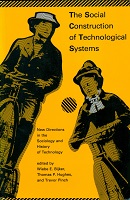 The Social Construction of Technological Systems : New Directions in the Sociology and History of Technology / ed.: W. E. Bijker, T. P. Hughes, T. J. Trevor. - Cambridge, Massachusetts ; London : MIT Press, 1987, 1989. - x, 405 p. : il. - ISBN 0-262-52137-7
The Social Construction of Technological Systems : New Directions in the Sociology and History of Technology / ed.: W. E. Bijker, T. P. Hughes, T. J. Trevor. - Cambridge, Massachusetts ; London : MIT Press, 1987, 1989. - x, 405 p. : il. - ISBN 0-262-52137-7
The impact of technology on society is clear and unmistakable. The influence of society on technology is more subtle. The 13 essays in this book have been written by a diverse group of scholars united by a common interest in creating a new field - the sociology of technology. They draw on a wide array of case studies - from cooking stoves to missile systems, from 15th-century Portugal to today's Al labs - to outline an original research program based on a synthesis of ideas from the social studies of science and the history of technology. Together they affirm the need for a study of technology that gives equal weight to technical, social, economic, and political questions
...............................................................................................................................................
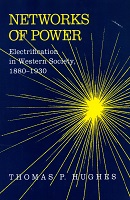 Hughes, Thomas. Networks of Power : Electrification in Western Society, 1880 - 1930 / T. P. Hughes. - Baltimore ; London : The Johns Hopkins University Press, 1993. - 474 p. : il. - (Softshell Books). - ISBN 0-8018-4614-5
Hughes, Thomas. Networks of Power : Electrification in Western Society, 1880 - 1930 / T. P. Hughes. - Baltimore ; London : The Johns Hopkins University Press, 1993. - 474 p. : il. - (Softshell Books). - ISBN 0-8018-4614-5
A unique comparative history of the evolution of modem electric power systems, "Networks of Power" not only provides an accurate representation of large-scale technological change hut also demonstrates that technology itself cannot be understood or directed unless placed in a cultural context. For Thomas Hughes, both the invention of the simplest devices (like the lightbulb itself) and the execution of the grandest schemes (such as harnessing the water power of the Bavarian Alps) fit into an overarching model of technological development. His narrative is an absorbing account of the creative genius, scientific achievements, engineering capabilities, managerial skills, and entrepreneurial risks behind one of the most commonplace amenities of the modern age. Thomas P. Hughes is professor of the history of modern science and technology at the University of Pennsylvania and a member of the American Academy of Arts and Sciences. His books include "Changing Attitudes toward American Technology" and "Elmer Sperry, Inventor and Engineer"
...............................................................................................................................................
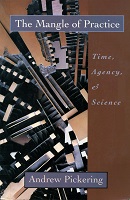 Pickering, Andrew. The Mangle of Practice : Time, Agency, and Science / A. Pickering. - Chicago : The University of Chicago Press, 1995. - 281 p. - ISBN 0-226-66803-7
Pickering, Andrew. The Mangle of Practice : Time, Agency, and Science / A. Pickering. - Chicago : The University of Chicago Press, 1995. - 281 p. - ISBN 0-226-66803-7
This ambitious book by one of the most original thinkers in science studies offers a sophisticated new understanding of the production of scientific knowledge and the nature of scientific, mathematical, and engineering practice. Andrew Pickering takes into account the extraordinary number of elements - social, technological, conceptual, metaphysical - that come together in the practice of science. He describes science as a zone of encounter where machines, instruments, facts, theories, disciplined human practices, and social relations are intertwined - engaged in a ceaseless and open-ended interaction he calls "the mangle of practice". The core of the book consists of extended case studies that show how the concept of the mangle advances our understanding of scientific work both past and present. Pickering discusses in detail the building of the bubble chamber, the search for the quark, the construction of the quaternion system in mathematics, and the introduction of computer-controlled machine tools in the industrial workplace, demonstrating how the contours and powers of the human, material, and social worlds have shaped one another in specific situations. Taken together, these studies illuminate the most fundamental aspects of scientific practice - the development of experimental apparatus, the production of facts, the creation of theory, and the interrelation of machines and social organization...
...............................................................................................................................................
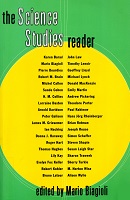 The Science Studies Reader / ed. M. Biagioli; in cons. with P. Galison [et al.]. - London ; New York : Routledge, 1999. - xviii, 590 p. - ISBN 0-415-91868-5
The Science Studies Reader / ed. M. Biagioli; in cons. with P. Galison [et al.]. - London ; New York : Routledge, 1999. - xviii, 590 p. - ISBN 0-415-91868-5
"The Science Studies Reader" is a landmark anthology of writing in the burgeoning field of science studies. Society and scientific community are today engaging more thoughtfully than ever before the question of what "scientific knowledge" might be. This collection of writings by some of the most prominent thinkers in the field speaks to the nature of science and its production across time, cultures, and genders. The Reader focuses on the practices of modern and contemporary science and technology in different national and institutional settings, with some attention to non-Western contexts. Here are essays on the gender dimensions of science, the moral economies of scientific communities, imaging techniques, techniques of communication, and many other current subjects. The collection represents science as crucially connected to issues within contemporary history, sociology, gender studies, anthropology, and cultural studies of science. By mapping some of the open questions and points of tension likely to occupy the field for years to come, the Reader casts fresh light on what "science" means at the end of the twentieth century. Mario Biagioli is Professor of the History of Science at Harvard University. He is author, most recently, of "Galileo Courtier" (1993)
...............................................................................................................................................
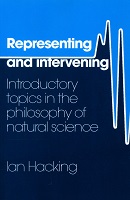 Hacking, Ian. Representing and Intervening : Introductory Topics in the Philosophy of Natural Science / I. Hacking. - Cambridge ; New York ; Melbourne : Cambridge University Press, 1983. - 287 p. - ISBN 978-0-521-28246-8
Hacking, Ian. Representing and Intervening : Introductory Topics in the Philosophy of Natural Science / I. Hacking. - Cambridge ; New York ; Melbourne : Cambridge University Press, 1983. - 287 p. - ISBN 978-0-521-28246-8
This is a lively and clearly written introduction to the philosophy of natural science, organized around the central theme of scientific realism. It has two parts. Representing deals with the different philosophical accounts of scientific objectivity and the reality of scientific entities. The views of Kuhn, Feyerabend, Lakatos, Putnam, van Fraassen, and others, are all considered. Intervening presents the first sustained treatment of experimental science for many years and uses it to give a new direction to debates about realism. Flacking illustrates how experimentation often has a life independent of theory. He argues that although the philosophical problems of scientific realism can not be resolved when put in terms of theory alone, a sound philosophy of experiment provides compelling grounds for a realistic attitude. A great many scientific examples are described in both parts of the book, which also includes lucid expositions of recent high energy physics and a remarkable chapter on the microscope in cell biology
...............................................................................................................................................
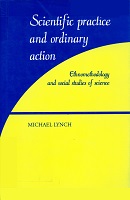 Lynch, Michael. Scientific Practice and Ordinary Action : Ethnomethodology and Social Studies of Science / M. Lynch. - Cambridge ; New York ; Melbourne : Cambridge University Press, 1993. - xxi, 333 p. : il. - ISBN 0-521-43152-2
Lynch, Michael. Scientific Practice and Ordinary Action : Ethnomethodology and Social Studies of Science / M. Lynch. - Cambridge ; New York ; Melbourne : Cambridge University Press, 1993. - xxi, 333 p. : il. - ISBN 0-521-43152-2
Philosophers, historians, and sociologists of science have grown increasingly interested in the day-to-day practices of scientists. Recent studies have drawn numerous linkages between scientific innovations and more ordinary procedures, craft skills, and sources of sponsorship. These studies dispute the idea that science is the application of a unified method or the outgrowth of a progressive history of ideas. This book critically reviews arguments and empirical studies in two areas of sociology that have played a significant role in the "sociological turn" in science studies: ethnomethodology (the study of ordinary practical reasoning) and the sociology of scientific knowledge. In both fields, efforts to study scientific practices have led to intractable difficulties and interminable debates, due in part to scientistic and foundationalist commitments that remain entrenched with social-scientific research policies and descriptive language. The central purpose of this book is to explore the possibility of an empirical approach to the epistemic contents of science that avoids the pitfalls of scientism and foundationalism. Michael Lynch is senior lecturer in the department of human sciences, at Brunel, The University of West London. He is the author of "Art and Artifact in Laboratory Science" and coeditor of "Representation in Scientific Practice"
...............................................................................................................................................
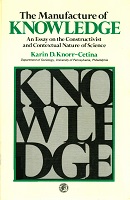 Knorr-Cetina, Karen. The Manufacture of Knowledge : an Essay on the Constructivist and Contextual Nature of Science / K. Knorr-Cetina; preface by R. Harre. - Oxford ; New York : Pergamon Press, 1981. - 189 p. - ISBN 0-08-025777-1
Knorr-Cetina, Karen. The Manufacture of Knowledge : an Essay on the Constructivist and Contextual Nature of Science / K. Knorr-Cetina; preface by R. Harre. - Oxford ; New York : Pergamon Press, 1981. - 189 p. - ISBN 0-08-025777-1
"The anthropological approach is the central focus of this study. Laboratories are looked upon within the innocent eye of the traveller in exotic lands, and the societies found in these places are observed with the objective yet compassionate eye of the visitor from a quite other cultural milieu. There are many surprises that await us if we enter a laboratory in this frame of mind ... This study is a realist enterprise, an attempt to truly represent the social order of life in laboratories and institutes of research, just as they are. By bringing the philosophical issues to the surface as matters not of prejudgement but as matters of concern, Karin Knorr-Cetina has developed the first really positive challenge to the philosophy of science since the days of paradigms and internal definitions of meanings" - from the Preface by Rom Harre
